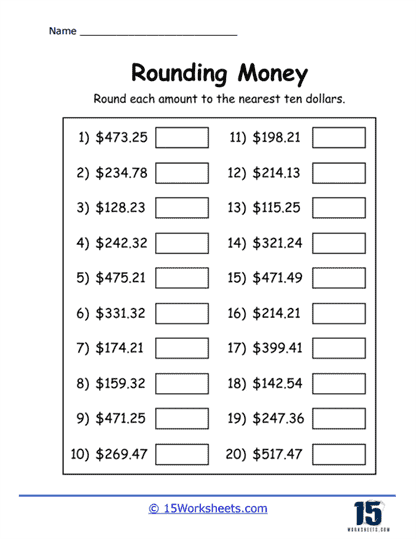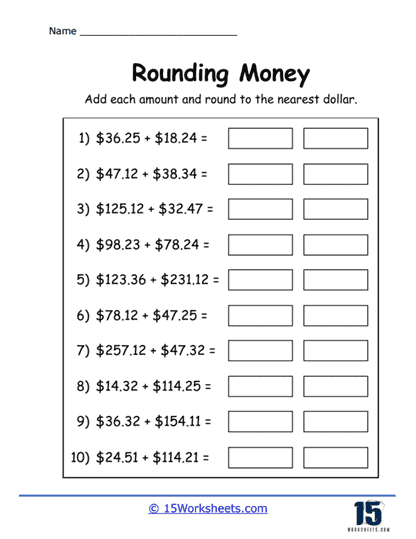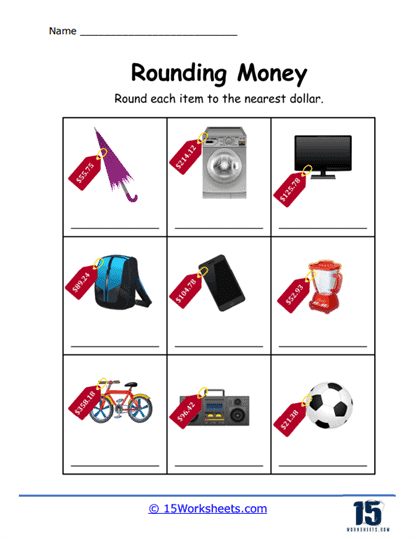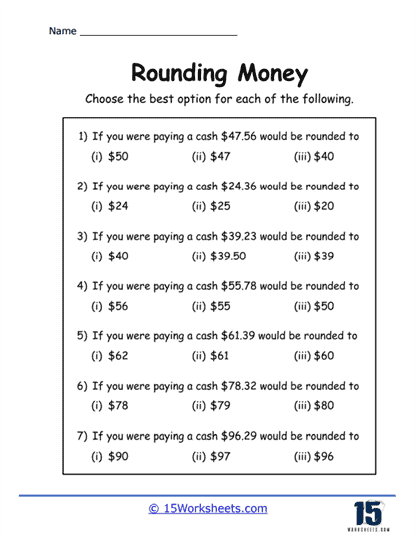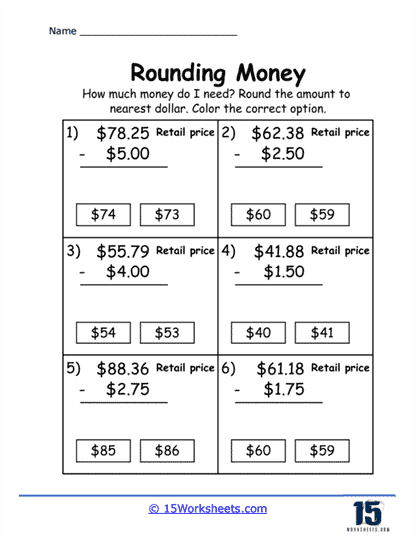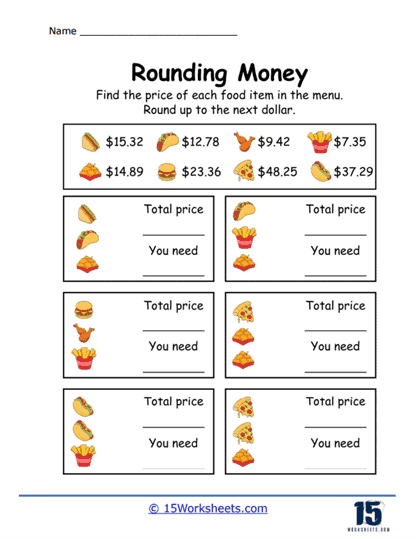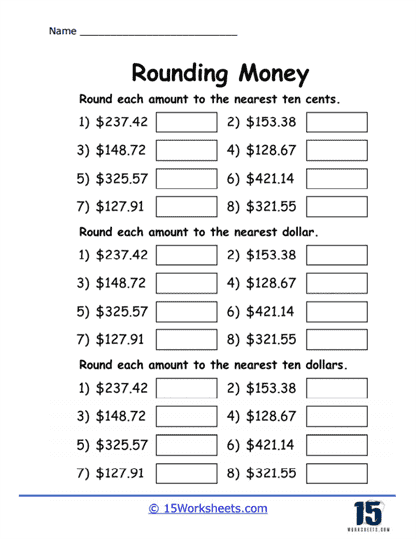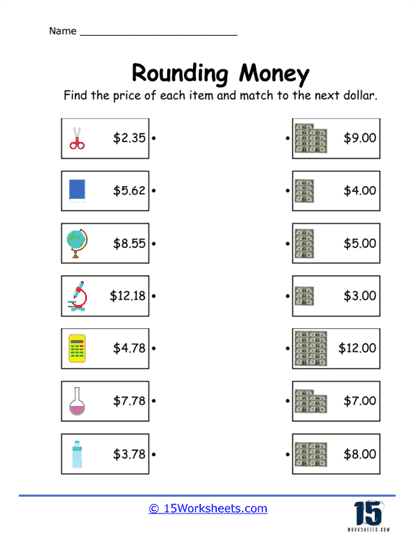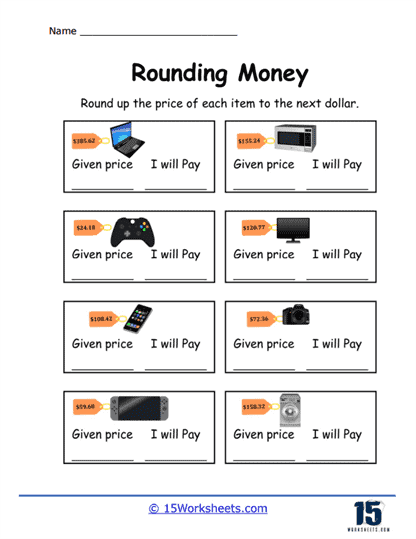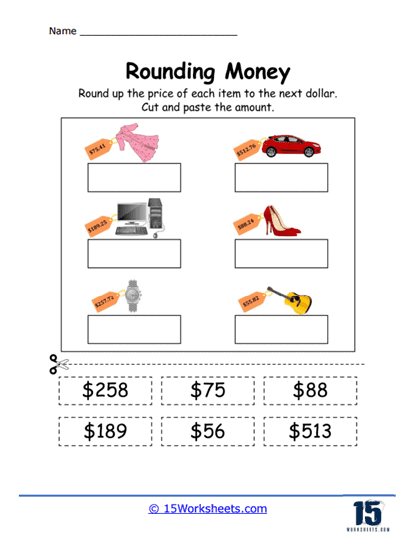Rounding Money Worksheets
About These 15 Worksheets
These worksheets will help students better understand the important skill of approximating the value of money to the nearest dollar, ten dollars, cent, or any other denomination relevant to the currency system being studied. These worksheets encompass a variety of exercises aimed at enhancing students’ numerical fluency, understanding of value, and ability to apply these concepts in practical financial contexts. Through engaging with these worksheets, students not only refine their mathematical skills but also gain a practical understanding of money management in real-life situations.
These worksheets cover a wide array of exercises, from basic rounding to applying these skills in complex, real-world scenarios. The practice gained from engaging with these worksheets not only improves students’ numerical and financial literacy but also equips them with practical skills for everyday financial management. Through a combination of improving numerical fluency, enhancing financial literacy, developing real-world math skills, fostering problem-solving and strategic thinking, building confidence in financial transactions, and encouraging independent learning, Rounding Money Worksheets prepare students for a lifetime of competent and confident financial decision-making.
This holistic approach to financial education underscores the importance of integrating practical financial skills into the curriculum, ensuring students are well-prepared to navigate the complexities of the financial world with knowledge, skill, and confidence.
Types of Exercises
Rounding to the Nearest Dollar – This type of exercise asks students to round monetary amounts to the nearest whole dollar. It is a fundamental activity that introduces the concept of approximation in financial terms, helping students simplify figures for easy calculation or estimation in everyday transactions.
Rounding to the Nearest Cent – For more granular financial calculations, students practice rounding amounts to the nearest cent. This exercise is particularly useful for understanding pricing and billing where exact figures are crucial, yet approximation is needed for quick calculations.
Using Rounding in Real-Life Scenarios – Worksheets often include scenarios such as shopping, banking, or budgeting activities where students must apply rounding principles. These exercises simulate real-world situations, requiring students to make approximate calculations to manage budgets, calculate discounts, or estimate spending. Some exercises focus on having students compare the original amount with the rounded figure. This helps them understand the impact of rounding on financial decisions and calculations, fostering a deeper comprehension of approximation accuracy.
Rounding for Estimation – These activities involve using rounding to make quick estimations of totals, differences, or in the context of financial planning. Students learn to use rounded figures to estimate the cost of multiple items or the total of a bill, enhancing their ability to make fast financial decisions.
Advanced exercises may present problems where students have to decide the best rounding strategy based on the scenario. This could involve choosing whether to round up or down to make a financial decision, encouraging critical thinking about the implications of rounding in various contexts.
The Benefits of These Worksheets
These worksheets significantly benefits students by enhancing their mathematical and financial skills through practical and engaging exercises. These worksheets are specifically designed to improve students’ numerical fluency, allowing them to work with numbers more flexibly and efficiently. By regularly engaging in rounding exercises, students develop their mental math skills, which are crucial for the quick assessment of financial information. This skill set enables students to make faster and more accurate calculations in their heads, an invaluable ability in both academic and real-world financial situations.
This type of work plays a pivotal role in enhancing students’ financial literacy. Through a variety of exercises, students are introduced to key aspects of financial management, such as budgeting, spending assessment, and cost estimation. This foundational knowledge is essential for developing sound financial habits early on, equipping students with the skills necessary to make informed monetary decisions throughout their lives. By understanding how to round money to the nearest dollar, cent, or other denominations, students learn to simplify financial information, making it easier to manage budgets and plan expenditures.
The application of mathematical concepts to everyday financial scenarios through these worksheets highlights the relevance and importance of math in daily life. Students grasp the critical role of estimation in managing finances, from planning purchases to simplifying transactions. This real-world application of math skills reinforces their understanding and demonstrates how mathematical concepts are not just abstract theories but practical tools that can be applied to everyday situations.
Students learn to navigate these challenges by making approximate calculations, a skill that proves invaluable in various aspects of life. Whether in academic settings or daily financial decisions, the ability to solve problems efficiently and accurately is significantly enhanced through regular practice with these worksheets.
Strategic thinking is another critical skill developed through the use of rounding money worksheets. Students are often faced with decisions about when and how to round figures, particularly in scenarios involving critical financial decisions.
These exercises encourage students to think analytically about the consequences of rounding up or down, fostering a strategic approach to financial planning and decision-making. This analytical thinking is crucial for students as they learn to evaluate financial situations critically and make decisions that best suit their needs or the needs of hypothetical scenarios presented in exercises.


